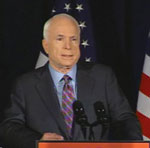In a speech on Wednesday not far from the corn fields of proud Missouri farmers, Republican presidential candidate Senator John McCain blamed subsidies for higher food prices.
 “My administration will reduce the price of food by eliminating the subsidies for ethanol and agricultural goods,” McCain told an invitation-only group at the Harry Truman Library in Independence, Missouri. “These subsidies inflate the price of food, not only for Americans but for people in poverty across the world, and I propose to abolish them.”
“My administration will reduce the price of food by eliminating the subsidies for ethanol and agricultural goods,” McCain told an invitation-only group at the Harry Truman Library in Independence, Missouri. “These subsidies inflate the price of food, not only for Americans but for people in poverty across the world, and I propose to abolish them.”
The senator has previously said that he was opposed to the 2008 Farm Bill calling it “a bloated piece of legislation that will do more harm than good for most farmers and consumers.”
McCain has been in the Senate for almost 20 years. Surely he knows that of the $307 billion in spending authorized by the bill through 2012, $209 billion is for nutrition programs and $25 billion is for conservation. Only about $35 billion goes to agricultural commodity programs, including research and market promotion, with just a portion going in direct payments to farmers.
“Agricultural goods” for the most part are food. America has the safest, most affordable and most abundant food supply in the world – and that is due largely to our farm programs. Like any government program, they can certainly stand improvement. But to make a blanket statement that subsidies for agricultural goods are inflating food prices is just unfair. Congress is on the brink of providing $700 billion in “subsidies” for financial institutions that have made bad investments in order to keep them solvent. A few billion to support our nation’s food supply and the development of alternative energy sources to wean us off foreign oil pales in comparison.

